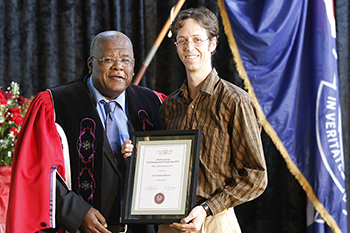Latest News Archive
Please select Category, Year, and then Month to display items
11 January 2021
|
Story André Damons
|
Photo Supplied
 Dr Ralph Clark
Dr Ralph Clark
The Afromontane Research Unit (ARU), the flagship research group of the University of the Free State (UFS) Qwaqwa Campus, has recently been granted R8,4 million to establish a Risk and Vulnerability Science Centre programme.
The Risk and Vulnerability Science Centre (RVSC) programme was established by the Department of Science and Innovation (DSI) as part of the Global Change Research Plan for South Africa and is funded by the DSI through the National Research Foundation (NRF). The RVSC will focus on the need to generate and disseminate knowledge about risk and vulnerability on global change challenges faced by local policy makers/ governance structures and communities in South Africa.
Invited to participate
Dr Ralph Clark, Director of the ARU, says the UFS, together with the University of Zululand and the Sol Plaatje University, has been invited to participate in Phase 2 of the RVSC programme. Dr Clark was approached by the DSI (on referral from the South African Environmental Observation Network – SAEON) in February 2020 regarding the potential for establishing a RVSC at the UFS Qwaqwa campus.
Subsequent interactions were held between the UFS and DSI, and in March 2020, the UFS formally accepted the DSI invitation. It has since been agreed that the RVSC: UFS will be hosted as a RVSC under the ARU umbrella, with dedicated personnel embedded at the UFS in this regard (internal processes and reporting) but reporting directly to the NRF regarding the RVSC.
Interest and support welcomed
Dr Clark welcomed this interest and support from the DSI-NRF, saying that the funds will further assist the UFS in growing its excellent and growing research portfolio and building more research capacity on this traditionally undergraduate-focused campus. “The RVSC will contribute to much-needed solutions in an area marked by major sustainability challenges and will assist in moving Phuthaditjhaba away from its negative apartheid history towards becoming a sustainable African mountain city,” says Dr Clark.
UFS Vice-Chancellor’s vision for 2016: R100 million before September
2016-03-03

|
At the official opening of the University of the Free State (UFS), held on 19 February 2016 on the Bloemfontein Campus, Prof Jonathan Jansen, Vice Chancellor and Rector, announced that his priority for the year is to raise R100 million. Deserving students who cannot afford to study will receive bursaries through the Student Bursary Fund Campaign.
Staff will also have the opportunity to contribute to the fund.
Prof Jansen thanked staff for their hard work in the midst of what he described as “by far the most difficult year for admissions, registration, accommodation, and student finance”. The heightened expectations of students after FeesMustFall and the limited capacity of the university to meet the desires of students took its toll on staff.
Because of the incredible strain taken by staff members, both emotionally and physically, the Vice-Chancellor gave staff the assurance that they will receive spiritual, emotional, and health support.
“Never before have I seen such dedication from all our staff to hold the university together in these trying times,” Prof Jansen said.
“Because of you, we have a record intake of first-year students into the UFS. We have had about 5 000 students on average in the past three years and, as of today, we are nearing 7000 first-years with the strong possibility that we will enroll several thousand more students, once the new South Campus registrations come on line later this year. By mid-2016, we will exceed our own target of 8 000 students,” said Prof Jansen.
He stipulated that it is not only good for the finances of the university but also for the youth of the country who can access a quality university in central South Africa where the safety of its staff and students is a priority.
Another highlight at this event was announcing Dr Christian Williams from the Department of Anthropology as the winner of the 2016 Distinguished Scholar Book Prize for his book, National liberation in postcolonial southern Africa: a historical ethnography of SWAPO’s exile camps.
Amidst the sad episodes of violence and destruction on campuses around South Africa, Prof Jansen highlighted how the UFS will – through a seven-point approach - manage the university during these difficult times:
1. Doing everything within our capacity to meet the needs of staff and students
2. Upholding the right to peaceful protest in our democracy
3. Acting swiftly against any unlawful actions by students or workers
4. Upholding the authority of the unions (only UVPERSU and NEHAWU)
5. Finding humane and just solutions to the problem of outsourcing
6. Not placing the UFS at financial risk by making irresponsible decisions
7. Maintaining an open door policy.